Table of Contents
Introduction
iPhone Users Statistics: The iPhone is a line of smartphones developed and manufactured by Apple Inc. It was first introduced to the world by Steve Jobs on January 9, 2007, and has since become one of the most iconic and popular mobile devices globally.
The iPhone runs on Apple’s iOS operating system, which is known for its user-friendly interface, security features, and smooth integration with other Apple products and services.
Since its initial launch in 2007, it has revolutionized the way people communicate, access information, and engage with mobile technology. With each new iteration, the iPhone has continued to attract a large and loyal user base.
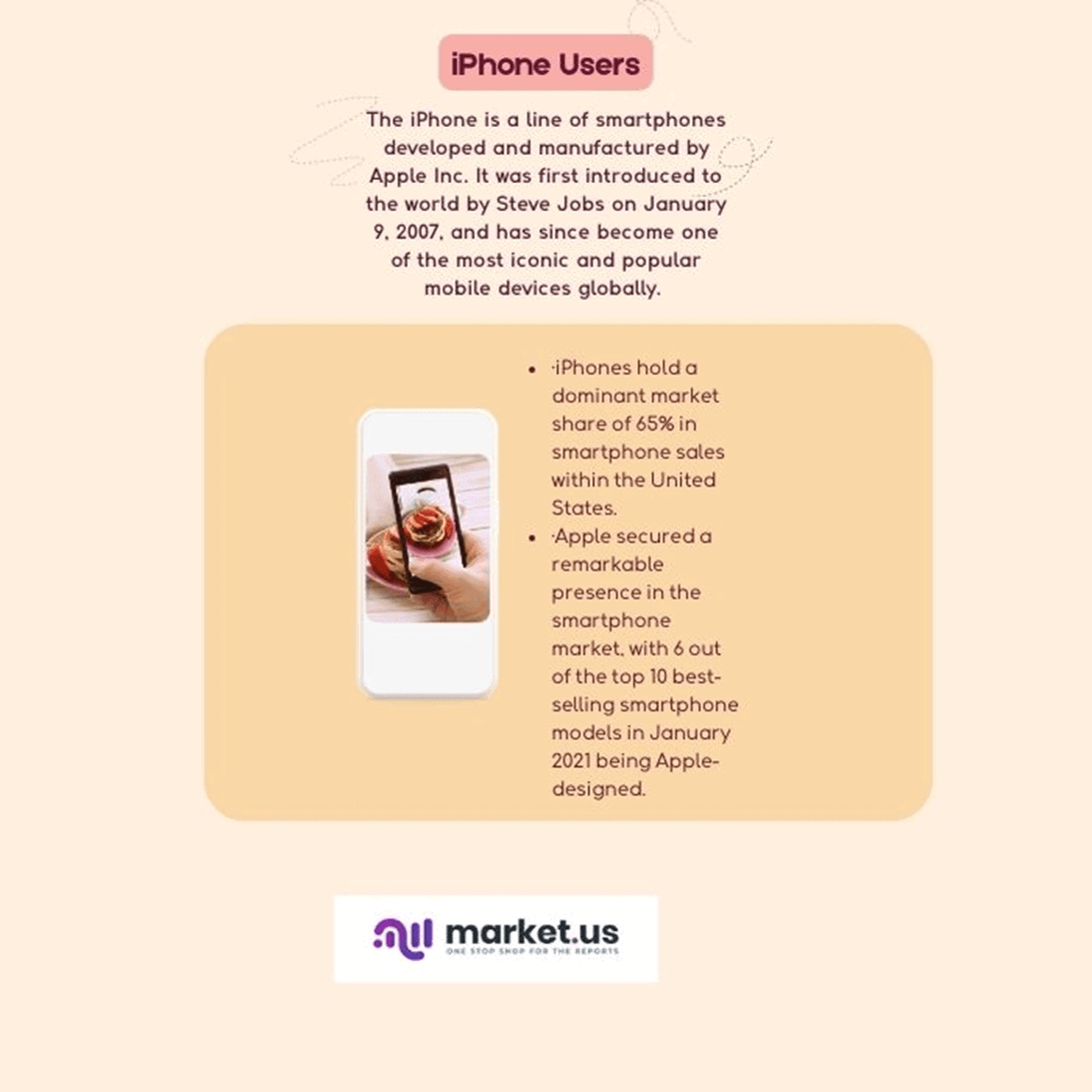
Editor’s Choice
- The Global Smartphone Market size is expected to be worth around USD 876.00 Billion by 2032 from USD 510.00 Billion in 2022, growing at a CAGR of 5.70% during the forecast period from 2023 to 2032.
- The number of iPhone users has surpassed 1 billion worldwide.
- Over 1.9 billion iPhones have been sold since the product’s inception.
- In the year 2020, Apple shipped a total of 206.1 million iPhones.
- iPhones hold a dominant market share of 65% in smartphone sales within the United States.
- Apple secured a remarkable presence in the smartphone market, with 6 out of the top 10 best-selling smartphone models in January 2021 being Apple-designed.
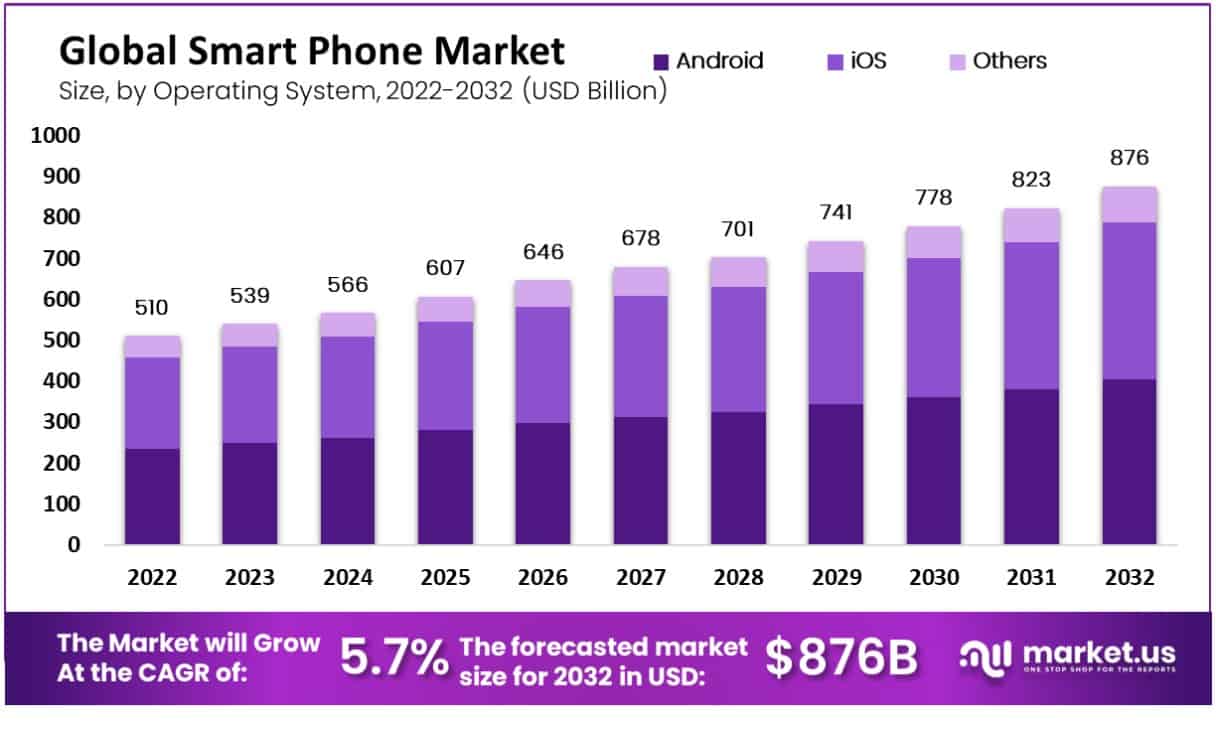
- Apple’s market share has shown a generally positive trend over the years, starting at 14.70% in CY 2017 and gradually increasing to 18.40% in CY 2022.
- The company experienced a dip in CY 2019 but recovered and maintained steady growth afterward. Apple’s growth indicates a sustained demand for its iPhones and successful product launches.
- Samsung, a major competitor of Apple, experienced some fluctuations in its market share during this period.
- It began at 21.70% in CY 2017, reached a low of 20.40% in CY 2020, and then increased to 21.40% in CY 2022.
(Source: ABI Research)
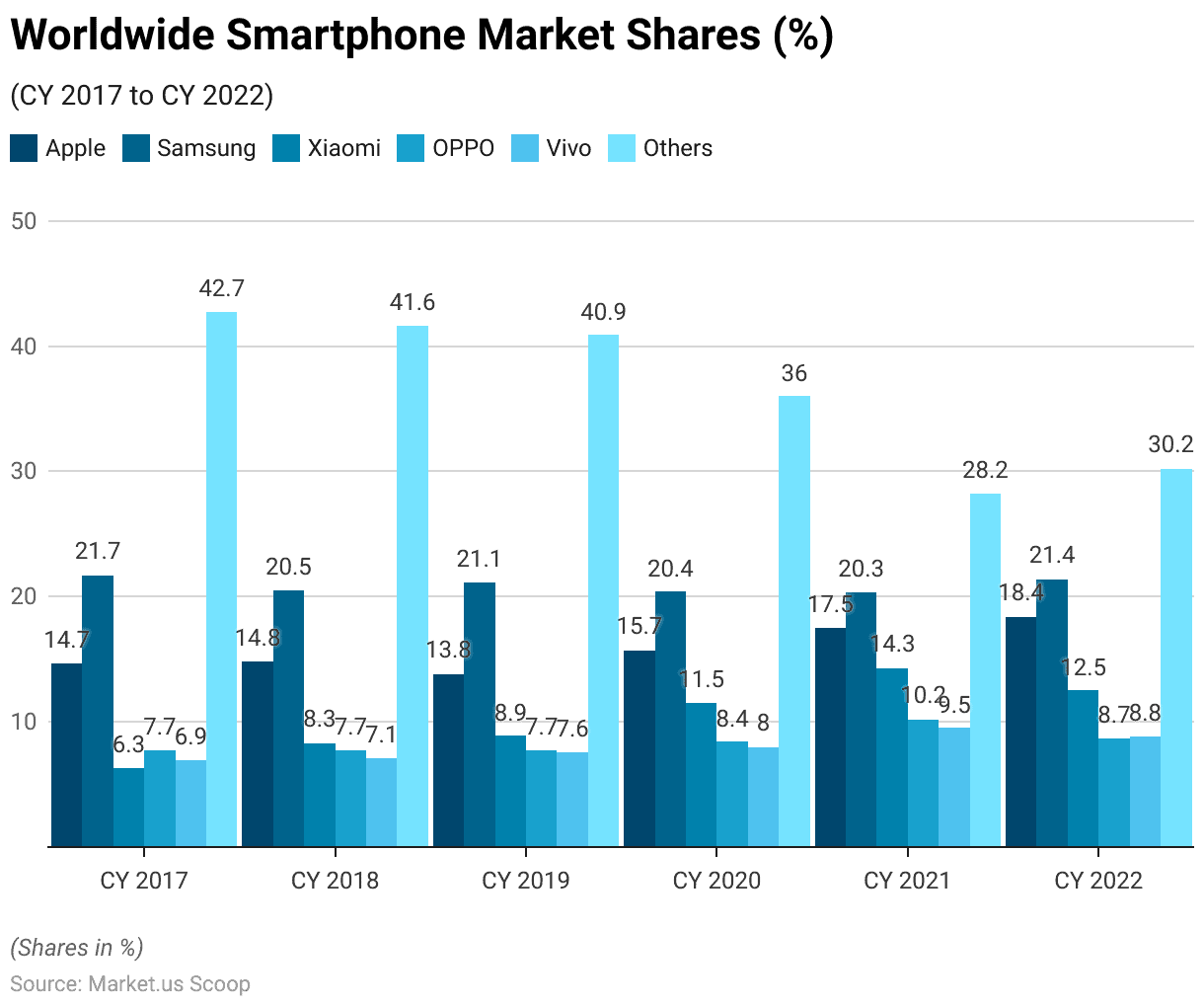
- Over the years, the market share of smartphones has witnessed significant changes. In 2007, smartphones had a modest 3% market share, indicating their relatively limited adoption. However, the landscape started shifting rapidly in subsequent years.
- By 2009, the smartphone market share surged to 14%, and in 2010, it reached 15%, showing a growing preference for these advanced mobile devices. The years 2011 and 2012 saw a substantial rise, both recording an 18% market share, signifying a significant shift towards smartphones. The market share stabilized at 15% from 2013 to 2015, indicating a steady acceptance of smartphones.
- In 2016 and 2017, the share remained at 14%, suggesting a temporary plateau in growth. From 2018 to 2020, the market shares slightly declined to 13% in 2019 but rebounded to 15% in 2020, demonstrating resilience in the face of market fluctuations.
- The trend took an upward turn again in 2021, reaching 17%, and further climbed to 18% in 2022, highlighting the continued expansion and widespread adoption of smartphones as essential communication and computing devices in modern life.
(Source: Counterpoint Research)
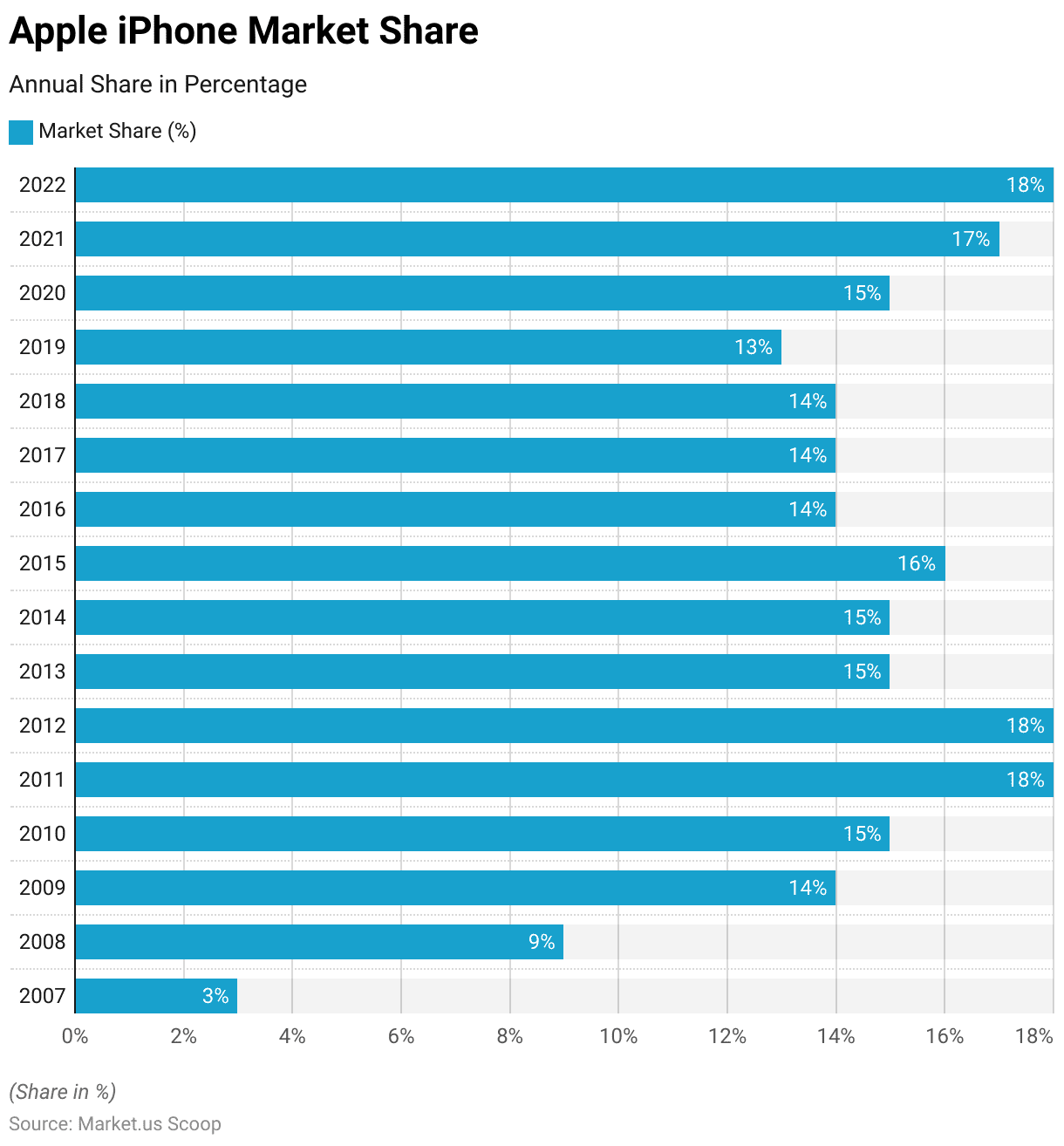
iPhone Users Regional Statistics
North America
- Between 2016 and 2020, the iPhone has maintained a strong and consistent presence in the North American smartphone market. In 2016, it held a market share of 43.50%, solidifying its position as a significant player in the region.
- The following year, in 2017, the iPhone’s market share slightly increased to 44.50%, indicating continued growth and popularity among consumers.
- In 2018, the market share dipped slightly to 43.90% but remained relatively steady.
- However, in 2019, the iPhone experienced a notable surge, reaching a market share of 46.90%, showcasing its ability to capture a larger share of the market.
- This upward trend continued into 2020, when the iPhone’s market share rose further to 47.40%, solidifying its dominant position in North America.
(Source: Tech Republic)
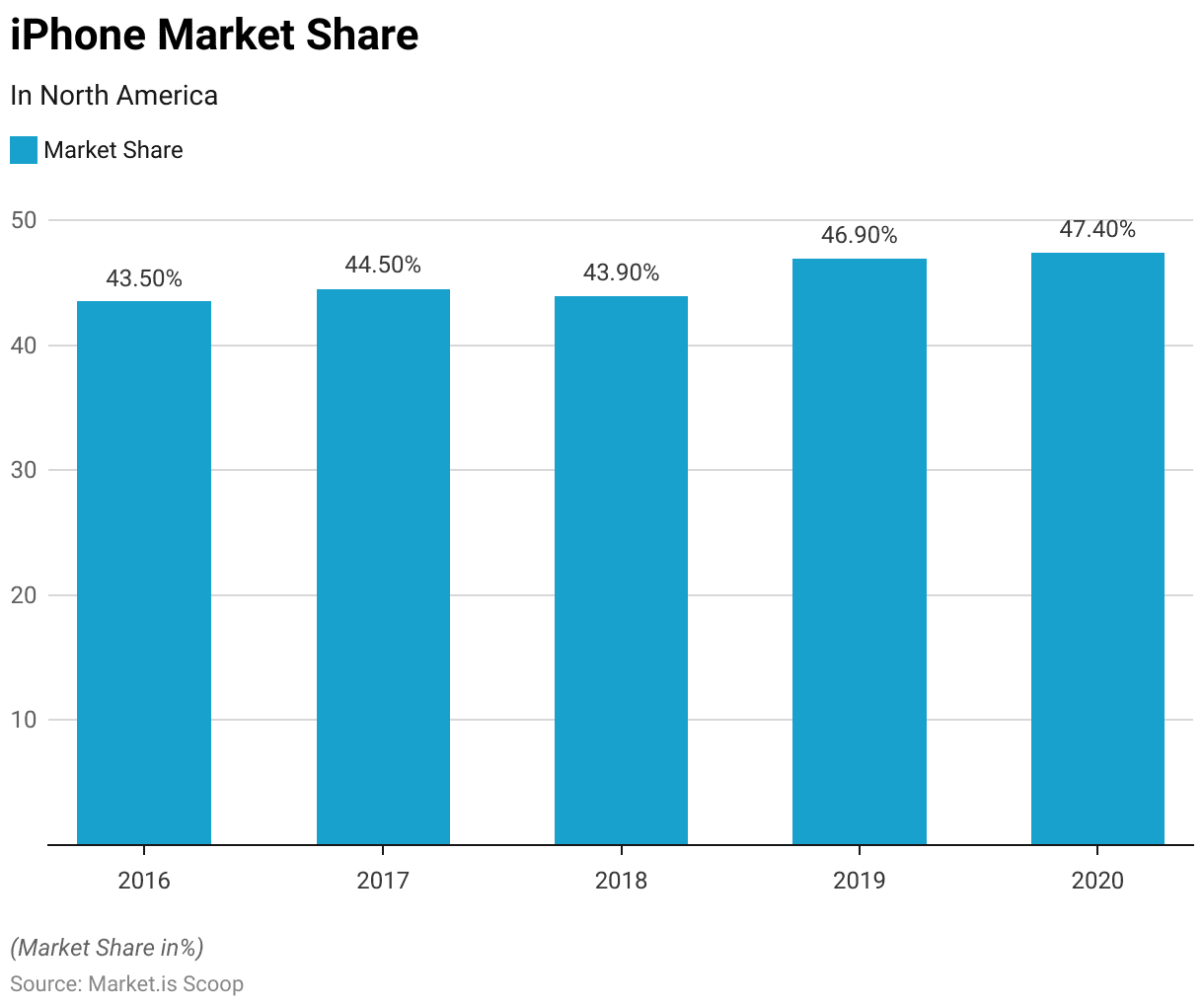
- Over the past few years, the iPhone’s market share in the United States has shown fluctuations. In the first quarter of 2016, it stood at 33%, which slightly decreased to 30% in the second quarter. However, it rebounded to 34% in the third quarter and significantly surged to 39% in the fourth quarter of the same year.
- The trend continued in 2017, with market share fluctuating between 29% and 45% across different quarters.
- In the first quarter of 2018, it settled at 37%, followed by a rise to 40% in the second quarter and maintaining around 39% in the third quarter.
- The fourth quarter of 2018 witnessed a substantial jump, reaching an impressive 47% market share.
- Throughout 2019, the iPhone maintained a strong presence in the US market, with its share ranging from 39% to 49%.
- The first quarter of 2020 recorded a 46% market share, and it remained consistent in the second quarter.
- However, in the third quarter, the market share dropped slightly to 40%. The final quarter of 2020 marked a significant surge, with the iPhone capturing a remarkable 65% of the US smartphone market.
- These figures indicate that the iPhone has experienced both ups and downs in market share over the years but has managed to maintain a substantial presence in the highly competitive US smartphone market.
(Source: Statista)
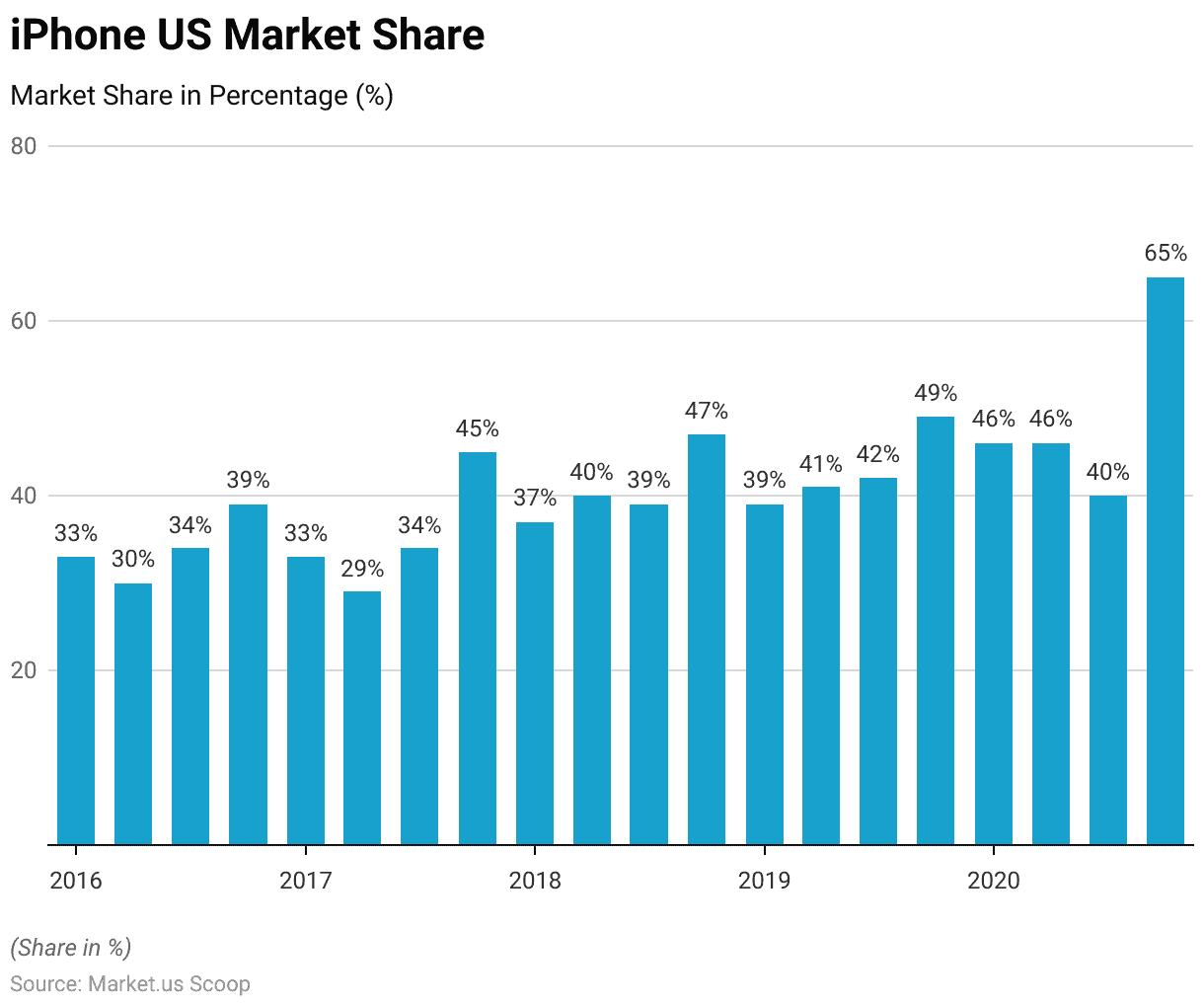
Asia Pacific
- Market share for Apple iPhone remains high in Asia from June 2022 to June 2023.
- Samsung and Apple are the leading contenders in the market, with fluctuating shares throughout the period. In June 2022, Samsung held the highest market share at 24.89%, while Apple followed closely behind at 17.41%.
- Xiaomi, Oppo, and Vivo also secured significant shares, with 18.11%, 9.34%, and 7.99%, respectively. Realme, Huawei, and the Unknown category accounted for smaller shares at 5.53%, 6.27%, and 2.81%, respectively.
- Over the next few months, the rankings experienced some variations. While Samsung maintained a prominent position, its market share slightly declined to 20.25% in June 2023. Apple, on the other hand, exhibited a fluctuating but generally upward trend, reaching 20.54% in June 2023.
(Source: StatCounter – GlobalStats)
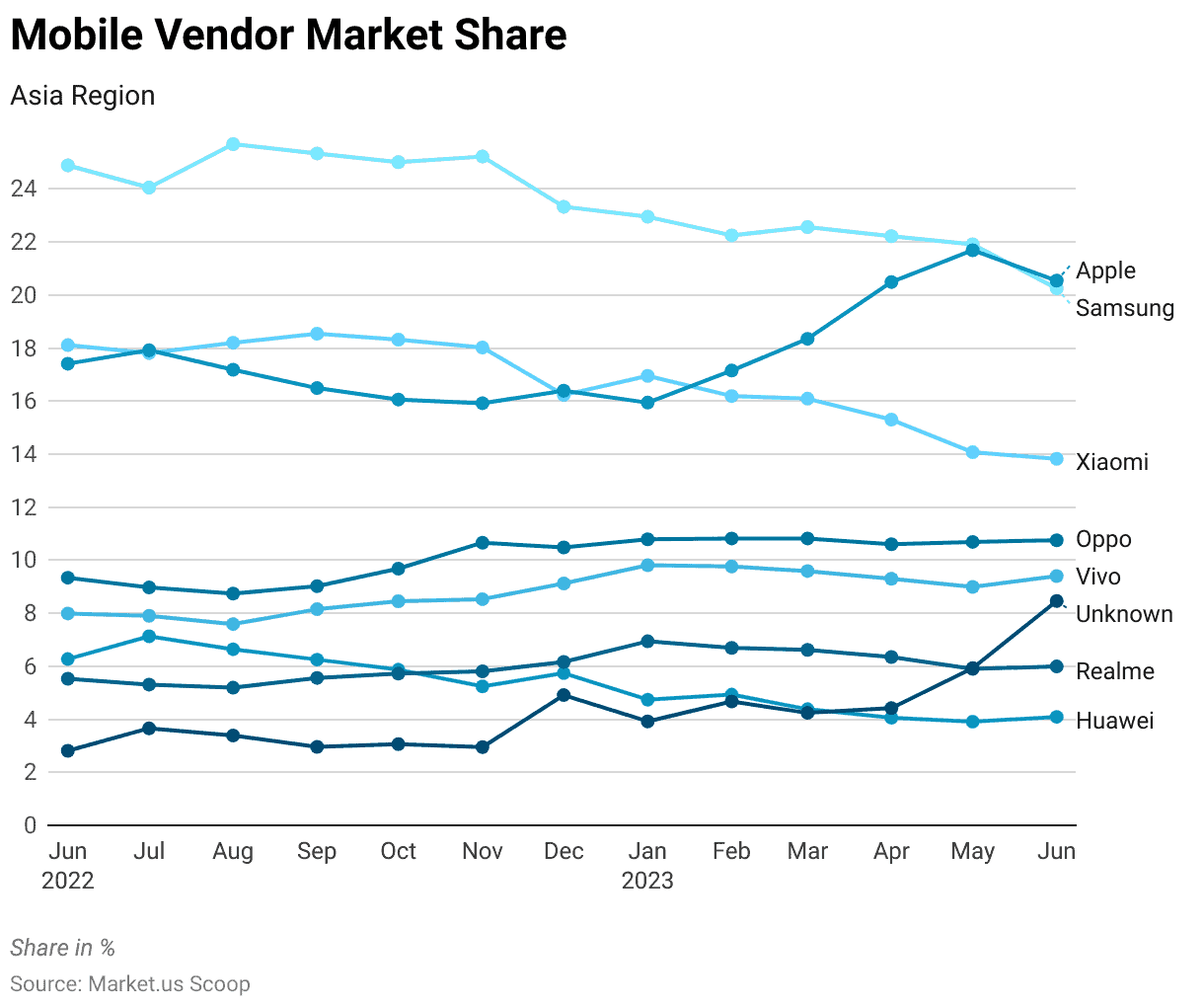
- Throughout 2021, Apple held a 23% share of the European market. Apple’s iPhone saw 11% year-over-year growth, allowing its market share to remain largely stable compared to 2020.
- Countries like the United Kingdom, Germany, France, and Italy have traditionally been strong markets for Apple, where the iPhone has performed well, driven by the brand’s premium image, customer loyalty, and strong ecosystem of products and services.
- In June 2021, the iPhone’s market share in China was at 21.95%, showing a strong presence in the market. However, it dipped slightly in the following months, reaching a low of 18.99% in October 2021.
- The market share then saw a gradual increase, reaching 23.96% in June 2022, indicating a rebound and recapturing a significant share of the market.
- The iPhone’s market share continued to hold steady in early 2023, with figures around 20% to 23%. In February 2023 and July 2023, the market share was at 23.97% and 20%, respectively.
(Source: Strategy Analytics, Counterstat)
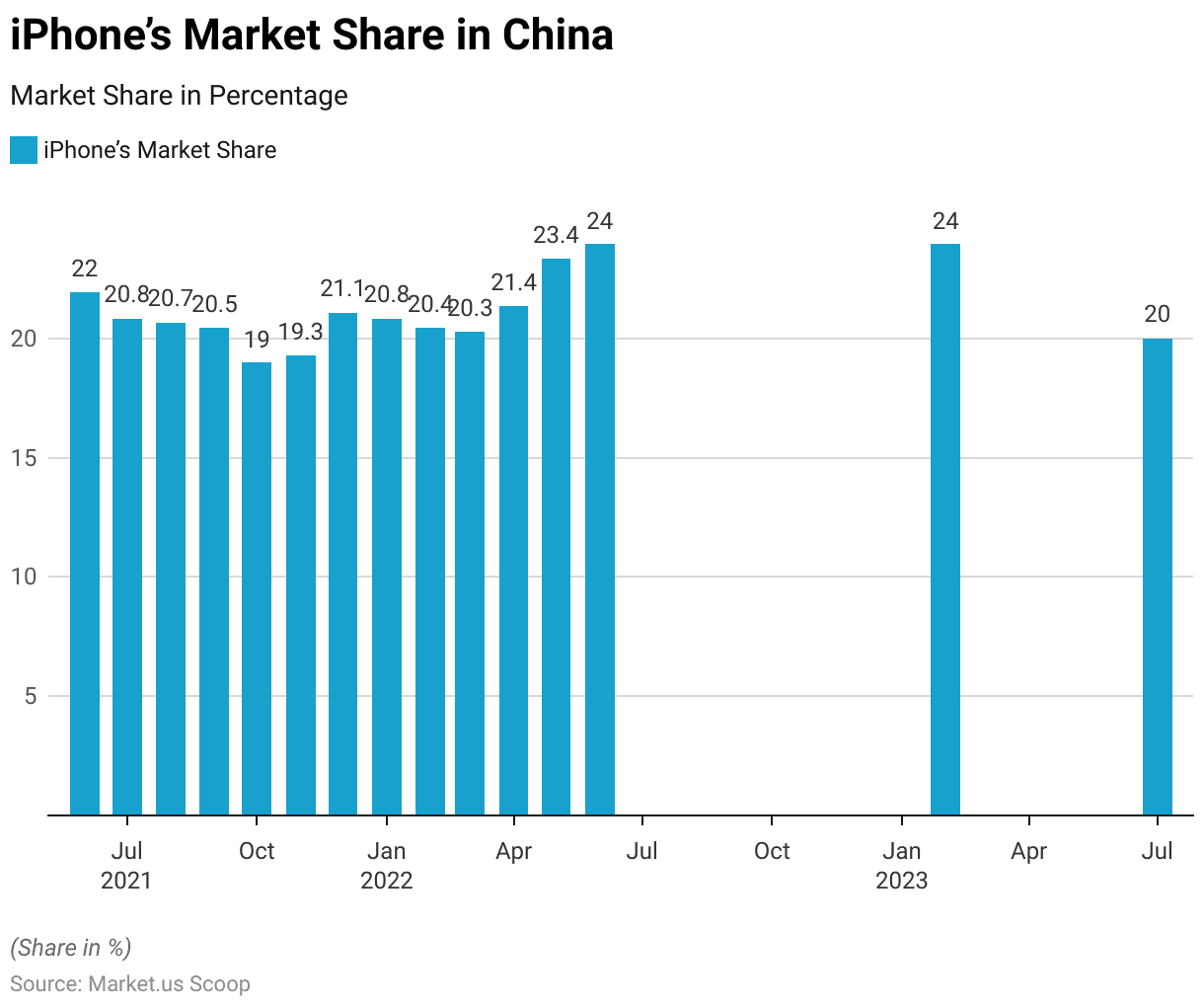
iPhone Users Statistics and Demographics
Age Distribution by iPhone Users Statistics
- As per a December 2021 poll of U.S. mobile users, around 58 percent of people using smartphones aged 18-34 used the iPhone as their primary device. On the other hand, users between the ages of 35-54 in the United States preferred using an Android phone, with 53% of this age group reporting using an Android-powered smartphone such as a Google or Samsung smartphone.
- Younger folks are the primary users of the iPhone. The 18-24 age group accounts for 22% of iPhone users, while the 25-34 and 35-44 age groups account for 27% and 23% of the iPhone user population, respectively. The iPad and iPhone have comparable age distributions, although the Mac is more popular among younger consumers.
- The 25-34 age bracket has the most users across all three devices, accounting for 27% of iPhone users, 28% of iPad users, and 31% of Mac users.
(Source: Statista, Consumer Intelligence Research Partners (CIRP))
Gender Distribution by iPhone Users Statistics
- Globally, females account for 51% of iPhone users, while males account for 49%.
(Source: Mobile Ecosystem Forum)
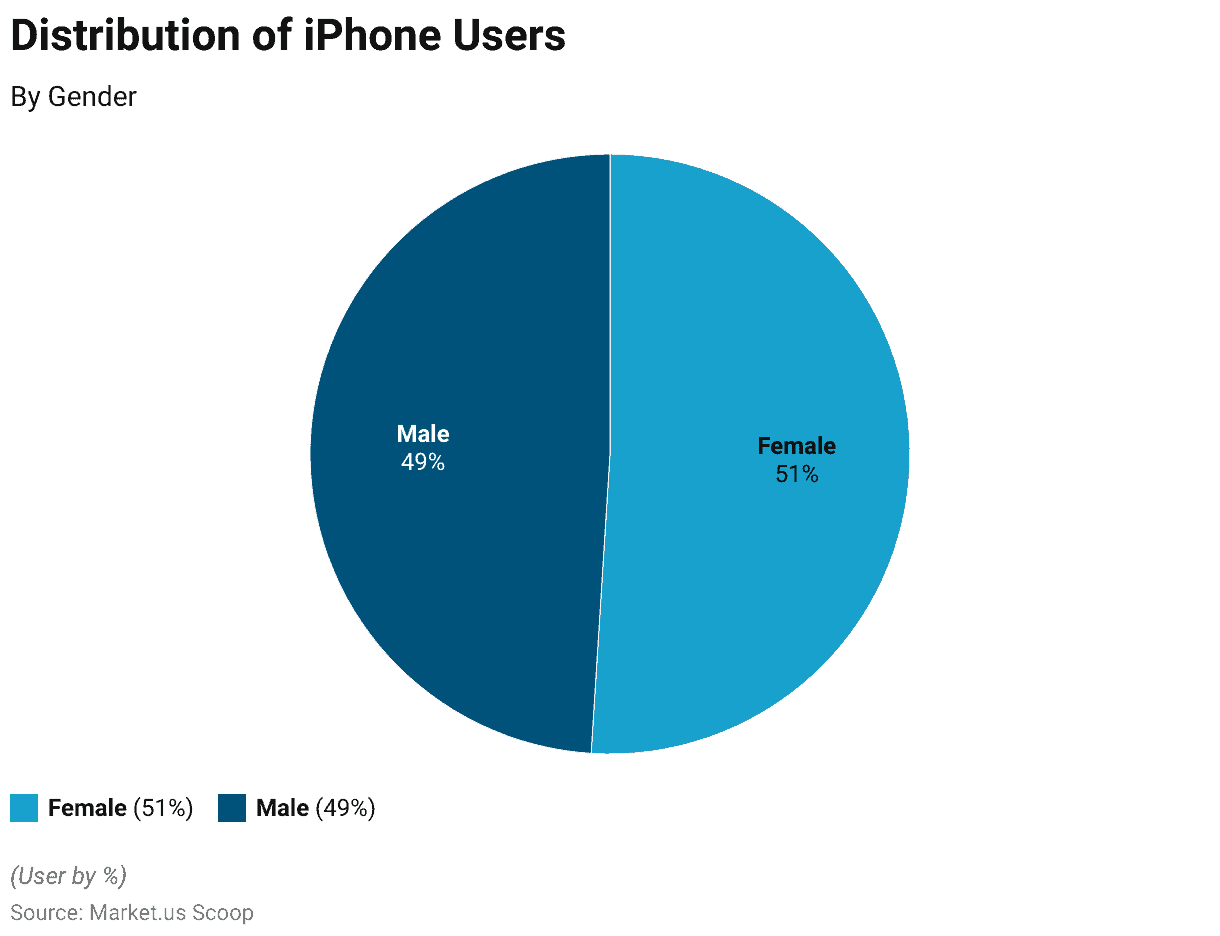
Income Distribution by iPhone Users Statistics
- iPhone users earn more than Android users – iPhones tend to attract premium or higher-income clients. The average iPhone app user earns $85,000 per year, which is 40% higher than the average Android phone user, who earns $61,000 per year.
- iPhone users are more affluent: they outweigh +11% for more than $75,000, +30% for more than $100,000, and +48% for more than $125,000. Android users are substantially less rich, but for income categories above $50,000, they still have above-average means. They are overweight but only to a minor extent: +4% to +14%.
- Android users reported an average annual income of $37,040 compared to $53,231 for iPhone users.
(Source: The U.S. Mobile App Report, CivicScience.com, 2018 survey from US-based eCommerce platform Slickdeals)
Education Level by iPhone Users Statistics
- iPhone users are better educated: they are overweight +27% for graduate/Ph.D. education and underweight -33% for high school education. Android users exhibit the same pattern, albeit to a much lesser extent: +8% for graduate/PhD, 12% for high school.
- iPhone users were twice as likely to hold a master’s degree and 55% more likely to hold a four-year bachelor’s degree. It was discovered that only 28% of Android users had a university degree, while 72% had not completed post-secondary education.
(Source: CivicScience.com, AYI Survey)
iPhone Users Statistics – Satisfaction and Loyalty
- According to 451 Research, a third-party research organization commissioned by Apple, the iPhone 14 has a 99% customer satisfaction rating.
- ASCI’s independent research on iPhone satisfaction in 2023 estimates the iPhone at 81%, well below 451’s 99%.
- As of July 6, 2023, 6% of people on Google give the various iPhone 14 models 1 star. That extraordinarily generous scale translates to a satisfaction score of 94%, which is still less than the 99% claimed by Apple.
(Source: American Consumer Satisfaction Institute Survey(ASCI))
Most Preferred iPhone – Users Statistics
- As of the 2021 data, the Apple iPhone 12 holds the highest market share among the listed smartphone models, capturing 6% of the market.
- Following closely behind, the Apple iPhone 12 Pro Max and iPhone 12 Pro hold 5% and 4% market share, respectively.
- The Apple iPhone 11 remains a strong contender with a 2% market share. Among the non-Apple smartphones, the Xiaomi Redmi 9A and Redmi 9 each have a 2% and 1% market share, while the Samsung Galaxy A21S, iPhone 12 Mini, Galaxy A31, and iPhone SE 2020 each hold a 1% market share. These figures highlight Apple’s dominance in the market, with multiple iPhone models securing significant shares.
- The iPhone 13 was the best-selling smartphone in 2022, accounting for 28% of total iPhone sales. It was the best-selling smartphone in major markets like China, the United States, the United Kingdom, Germany, and France.
- Furthermore, from September 2021 to August 2022, the iPhone 13 was the number one smartphone each month.
- Following the release of the iPhone 14 series, price drops increased demand for the iPhone 13 in developing markets. The iPhone 13 sold twice as many units as the iPhone 13 Pro Max, which was the second-best-selling smartphone in 2022.
(Source: Counterpoint Research)
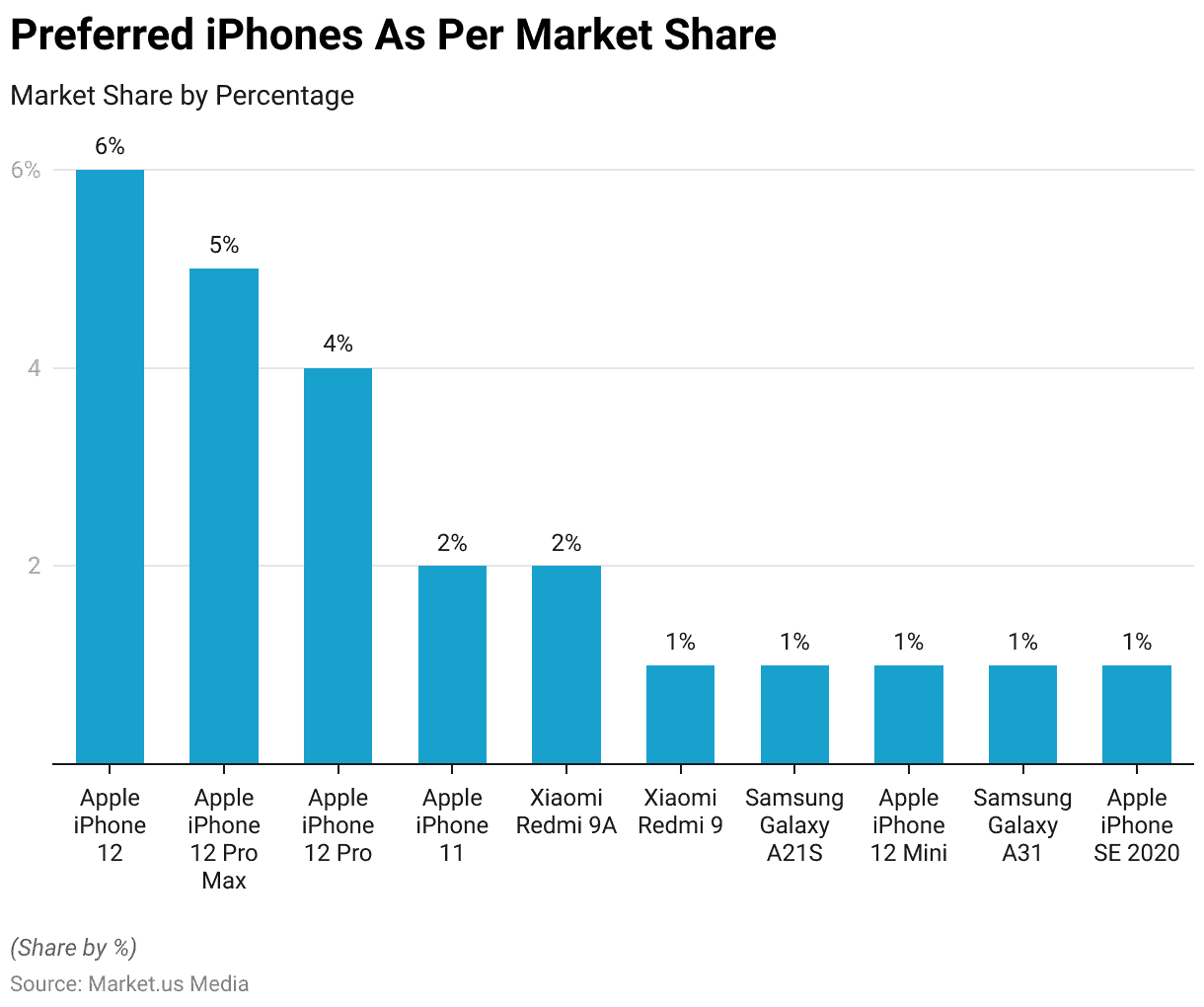
Recent Developments
User Growth:
- There are currently 1.334 billion active iPhone users worldwide, an 8.37% increase from the previous year.
- In the United States, there are 124.7 million active iPhone users, growing by 7.22% over the past year.
Product Shipments:
- Apple shipped 231.8 million iPhones in 2023, a slight increase of 2.89% compared to the previous year.
- Despite this, the shipment volume was slightly below the all-time high of 233.9 million units in 2021.
Market Share:
- iPhones hold a 23% share of global smartphone shipments as of Q4 2023, an increase from 16% in the previous quarter.
- In the U.S., iPhones account for 62% of smartphone shipments, up from 53% in Q3 2023.
Revenue Contributions:
- iPhone sales contributed to 52% of Apple’s total revenue in 2023, maintaining its position as the largest revenue generator for Apple.
- Apple’s overall revenue for 2023 was $383.2 billion, with significant contributions from iPhone sales.
Market Strategies and Innovations:
- Apple is exploring new product categories, including a potential virtual reality headset and self-driving car, aiming to diversify beyond the iPhone.
- Recent product launches like the Apple Watch and AirPods continue to support the iPhone ecosystem, enhancing user experience and driving accessory sales.
Conclusion
iPhone Users Statistics – Based on the information provided, the statistics show that iPhones have gained significant popularity and a substantial user base globally.
With over 1 billion users worldwide and more than 1.9 billion iPhones sold since its initial launch, it is evident that iPhones are widely adopted and preferred by a large number of consumers.
Based on the information provided, the statistics show that iPhones have gained significant popularity and a substantial user base globally.
In terms of market share in the United States, iPhones have consistently maintained a strong position. Over the years, their market share has experienced fluctuations, but they have consistently held a significant portion of the market.
FAQs
As of September 2021, Apple had sold over 2.2 billion iPhones since the product’s launch in 2007.
iPhone’s market share fluctuates over time, depending on various factors like product releases, competition, and global trends. As of 2021, the iPhone’s market share was around 15% to 20%, trailing behind Android-based smartphones, which dominate the market with over 75% to 80% market share.
The United States has historically been one of the biggest markets for iPhones. However, China has emerged as a significant market for Apple, with a large and growing user base. Other countries with substantial iPhone user populations include Japan, the United Kingdom, and Germany.
iPhone users span a wide range of age groups. Historically, younger demographics, particularly those between 18 to 34 years old, have shown a higher preference for iPhones. However, Apple has a broad user base across various age brackets, including older users who appreciate the brand’s ecosystem and user-friendly interface.
Discuss your needs with our analyst
Please share your requirements with more details so our analyst can check if they can solve your problem(s)



